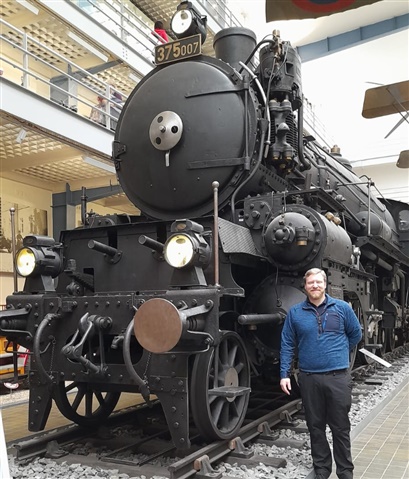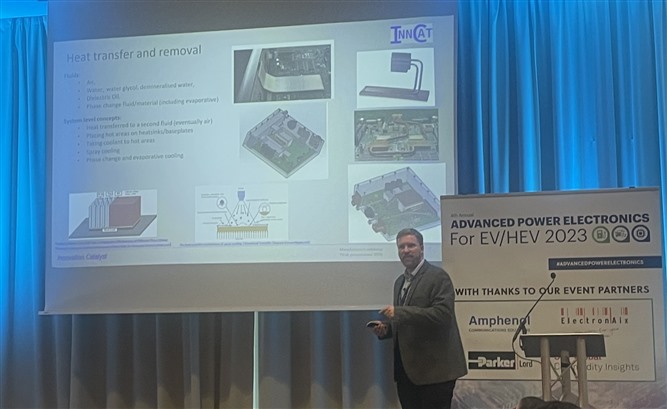In the first of our 'My Engineering Career Journey' blog series, we spoke with EngX Community member Simon Hart, Director and Chief Technology Innovation Officer at Innovation Catalyst (InnCat), a power electronics and electric motor control software engineer and also a Trustee of the IET!
Simon gave us an insight into his career journey and how he got to where he is today:
 Who am I?
Who am I?
I am Dr Simon Hart MEng CEng PhD FIET, I have worked as an engineer in the field of power electronics and electric motor control software, plus innovation and IP generation / protection for 28 years.
I’m now a Director and Chief Technology Innovation Officer at Innovation Catalyst (InnCat). It is a firm that supports companies in their quest for differentiating innovation in the technology space. From facilitating innovation, through identifying and protecting IP to proof-of-concept development.
How I got into this field
I have always been fascinated by electricity and electronics. My grand-uncle gave me some batteries and bulbs when I was very young, and I enjoyed making circuits.
My school didn’t offer electronics as an A-level physics option, so, because my teacher had studied electronics at university, he lent me his notes and helped me through.
Back then, mobile phones were becoming available to all, so I decided to take modules in cellular telecoms at university. I also worked on an outer-space robust power supply project as the University of Surrey (UniS) was developing micro-satellites. I think that high-power engineering is awesome and this led to electric motor control and software. I had many passionate university lecturers who motivated me.
Things I have done along the way
A UK drive manufacturer sponsored me during my PhD, and I’ve stayed close to this area throughout my career – a career that began with industrial motors, power electronics and control software, before I moved into automotive and now aerospace. I had a steep learning curve regarding motor control but, luckily, I had very experienced colleagues willing to support me. I guess now I would be considered an expert!
At this point I got lucky (again) and was invited to found the power electronics and software business function of an Oxford University spinout…that was eventually bought by Mercedes Benz. I had wanted to move into automotive to do my bit in tackling climate and environmental issues. The folks that joined me for the journey and gave so much energy and time were inspiring. Now, I also work in aerospace (flying cars?).
I moved into consultancy because I wished to help lots of companies at varying moments in their journeys. This work drew me into helping startups, spinouts and scaleups. Technology motivates me, but also people that see the potential in the technology, particularly in trying to tackle climate change.
Having software in many hundreds of thousands of products is quite daunting. You have to trust the design and test methods.
Oh, and by the way…
...I was voted in the top three Technology Leaders in Wales in 2021.
Changing attitudes
Power electronics and motors were seen as old fashioned because they had been around for many years. But there is always new application (the current re-invention of electric cars and planes) and optimisation. The big one for me at the moment is the removal of rare earth materials from power dense motors, which means removing the permanent magnets.
I was assumed to be a nerd (which is cool now!) and I am neurodiverse (which is a gift!). Most of my school friends went down traditional career routes, but I am in the right place now that innovation is in vogue!
Another misconception is people assume that I’m an electrician, because my hobbies include building and renovations.
My most testing project...
If there was a highly challenging project with an excellent outcome, it was designing the first (we think) fully coolant submerged motor controller for an automotive project. This was great fun. Many of our challenges came out of the non-obvious nature of the work (putting fluids directly onto power components for example!). We had to develop and prove a whole new cooling method.
When we looked at cooling our power electronics with dielectric oil (as this was the coolant on the vehicle) we faced the issue that the oil is a less effective coolant than water (the standard approach). So, we decided to remove some of the constraints and submerge the power electronics directly in the oil (it does not conduct!). I then took many aspects of fluid cooling to combine jets, impingement, turbulence, and flow to create a new method of cooling. This all led to cornerstone patents for the business.
It can be difficult to be creative and remain motivated (we went through many failed attempts), while balancing lots of great aspects into an innovation. Having a less traditional way of looking at things helps, but so does having a strong process and an analytical approach.
Technical requirements are key, but sometimes you have to ‘think outside the box.’ For example, we moved from silicon to silicon-carbide power electronics. While it meant that the power electronics cost more, the whole vehicle system cost less because it was more efficient, leading to a reduction in battery size.
Changing how we approach a solution
Engineers help turn scientific principals into useful items that have a positive impact. We are natural problem solvers; however, we need to go beyond this and become solution focused. By this I mean instead of simply repeating the same ideas to solve the next problem on the way to a solution, we can instead step out and focus on the best solution. This in turn lets us disrupt standard thought processes and identify major advances.
I always think about the impact of disclosing an idea or invention. There are many ideas that I thought might lead society in the wrong direction, which I have never published.
Sustainability and safety are important to me, along with helping to tackle climate and environmental issues. Hence my working in electrification of transportation and now in removing rare earth materials from products. I often start sessions of “designing for manufacturing” with designing for recycling (and reuse) instead.
Topping up the knowledge tank
To keep up to date with developments in technology and my field of engineering, I read a lot of articles, papers, and patents. Another method is attending (and occasionally presenting at) conferences to sustain my knowledge and see where the state-of-the-art is heading.
Right now, I am upskilling in electromagnetics, something I will need to innovate the next generation of efficient, sustainable, and recyclable motors. Beside these, I help develop technology and product roadmaps.
The value of Professional Registration
I’ve been a Chartered Engineer for several years and I found the process of professional registration excellent in becoming a better-rounded engineer. It meant I could properly benchmark myself as an engineer within the profession.
Up to now, my career has been in a state of continuous evolution. It has moved me from industrial to automotive and now aerospace. I’ve moved from software back to power electronics and I now do both. While I have been in executive management, it has always had a technology focus. That focus is continuing now that I run a consultancy, and this means I can help many more companies.
Why meeting people matters
To build a successful career in this field, it is a must to build and keep a network of good engineers and professionals. Important because they can help you learn and fill gaps in your skills. It makes a real necessity of attending events and volunteering. Along the way, you meet a huge range of interesting people, some of whom may mentor you to the next stage in your career.
I meet many folks through volunteering at the IET. Working with the IET’s committees helped me gain lots of skills, particularly on how to meet, discuss and work with a wide range of people. It also showed me how to create a large personal network. I try to help everyone, and they help me (even though this is not why I help them in the first place). Lots of folks have helped me.
To inspire…and be inspired
 In any career, a large part of your success can come out of the people you meet along the way. In my time, I’ve had a few mentees and I have helped many colleagues in their career journeys. For me, networking is good, and so is reading and engaging in discussions. Volunteering is also good and great fun.
In any career, a large part of your success can come out of the people you meet along the way. In my time, I’ve had a few mentees and I have helped many colleagues in their career journeys. For me, networking is good, and so is reading and engaging in discussions. Volunteering is also good and great fun.
Talking of mentoring…you need to excite students early, so, to do this I helped designed and run STEM stands at schools’ fairs.
Further along the educational journey, I am an Honorary Associate Professor at the University of Nottingham, where I get to inspire the next generation of engineers. Alongside this, I am also an active IET volunteer. This means there are events to be attended and volunteering to be done. In the course of that you meet a huge range of interesting people, some of whom you may guide to the next stage in their career.
My career has benefitted because attending motor conferences and making the right connections led to me move from industrial to automotive at the perfect time to support the rise of Electric Vehicles (EVs). The advice from a wide number of folks helped me decide to leave a stable large company and join a highly dynamic small startup.
Final thoughts
Engineering is forever evolving as it supports modern life. Flying cars (eVTOLS) are at last here! There is more focus on using materials wisely while making reuse and recycling key. We need fewer disposable items, and to plan the second life of products at the beginning of the product development cycle.
Keep positive. If you are negative you are guaranteed to fail, if you are positive you might succeed.
If you want a career in engineering… go for it, as long as your heart is in it. It is easy to have a career in something you love doing. You need a lot of study, and you will have failures on the way. But, as long as you keep learning, particularly from the failures, you will have a great career.
Want to share your own Career journey with the EngX Community? Let us know at community-online@ietengx.org
#AchieveGreatThings
#careerjourney